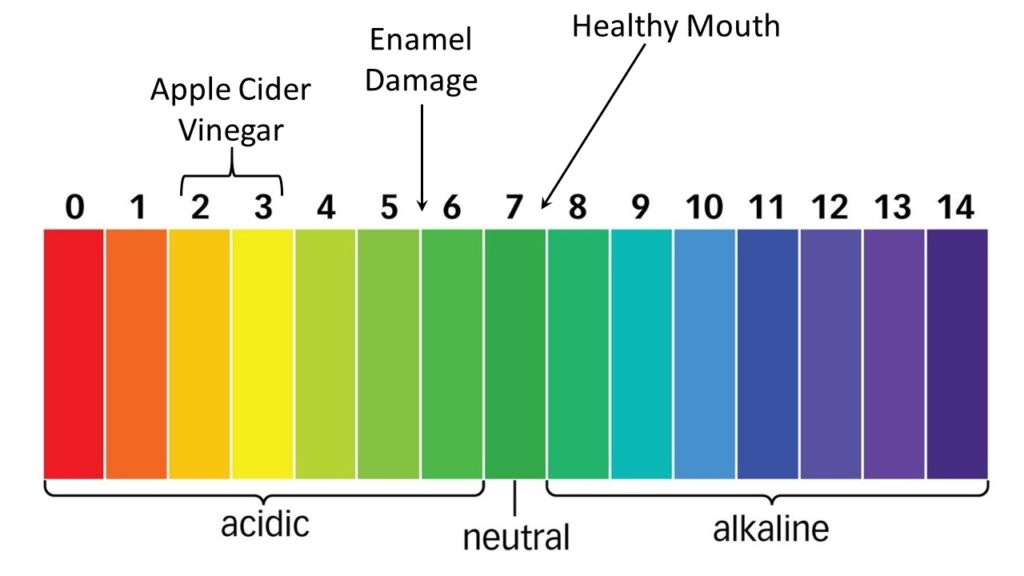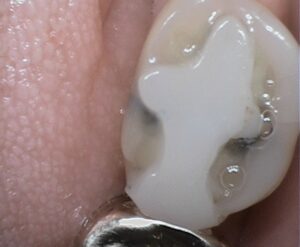Is Apple Cider Vinegar Destroying Your Teeth?
 We have seen an alarming trend in recent years: acid erosion from the use of apple cider vinegar in the mouth. As more and more people are seeking alternative medicine and all-natural remedies, some turn to apple cider vinegar as a supplement. We love seeing people take action to improve their health. Unfortunately, this action is detrimental to your oral health.
We have seen an alarming trend in recent years: acid erosion from the use of apple cider vinegar in the mouth. As more and more people are seeking alternative medicine and all-natural remedies, some turn to apple cider vinegar as a supplement. We love seeing people take action to improve their health. Unfortunately, this action is detrimental to your oral health.
Here are the important things you need to know about apple cider vinegar and its effects on your mouth.
What is Apple Cider Vinegar?
Apple cider vinegar is actually a grocery item, commonly used in many recipes. The name describes its origins perfectly. It is a vinegarized version of cider from the apple fruit. It is non-alcoholic and not sweet at all. It has an extremely sour taste and a very low (acidic) pH.
It has some antimicrobial properties, so people often use it as a natural remedy to fight bacterial, viral, and fungal infections.
How Do People Use Apple Cider Vinegar?
Many people incorporate apple cider vinegar into their diets by using it when cooking. Some dilute it with water and drink it. Others use it on their hair and skin, and some even use it as a cleaning agent.
Unfortunately, some people promote swishing two to three teaspoons around the mouth twice daily to kill bacteria, whiten teeth and improve bad breath. We say unfortunately because this is very bad advice!
How Does Apple Cider Vinegar Affect the Teeth?
The pH of apple cider vinegar is in the range of 2-3 on the pH scale. At this pH measurement, we consider apple cider vinegar a very strong acid similar to lemon juice. All acids are dangerous to your teeth.
 Teeth contain the hardest substances in the human body: enamel and dentin. Enamel covers the visible portion of the teeth, and dentin makes up the bulk of the hard structure of the teeth. Both are harder than bone.
Teeth contain the hardest substances in the human body: enamel and dentin. Enamel covers the visible portion of the teeth, and dentin makes up the bulk of the hard structure of the teeth. Both are harder than bone.
Strong acids can soften, weaken and dissolve these hard tooth structures. Enamel begins weakening at a pH of 5.5 or lower, and dentin softens at a pH of 6.5 or lower. You can see that apple cider vinegar is far below both of these thresholds!
Allowing these strong acids to be in contact with your teeth places you at risk for acid erosion. Acid erosion causes an irreversible loss of enamel and dentin.
As enamel becomes thinner, the tooth loses its insulating effect, so teeth with acid erosion are often very sensitive to cold temperatures.
What Might Teeth with Vinegar Erosion Look Like?
As acid erodes away tooth structure, a few visible changes will take place. First of all, enamel becomes thinner. Enamel forms a protective coating around the rest of the tooth structure. It is white in color and relatively translucent. As it gets thinner, the teeth may appear more yellow or even a little “see-through”. They may also appear more dull and less reflective of light.
Acid erosion slowly wears away tooth structure, and it can leave the teeth looking flat or shortened. Typically, you will see short, flat, dull, yellow teeth when someone has severe acid erosion.
How Can I Repair the Damage of Apple Cider Vinegar on my Teeth?
As we mentioned earlier, this type of erosion is irreversible. Once that enamel is lost, you cannot rebuild it on your own. You must replace it with dental materials. The right treatment for restoring missing tooth structure depends on the extent of the damage.
Tooth-Colored Filling Material
When the loss of tooth structure is minor, you can rebuild the teeth with tooth-colored filling material. Some people refer to this as “bonding”, a term that is not our favorite. While the material does form an adhesive bond with healthy tooth structure, it is far more sophisticated than the images of Bondo that this term may conjure in your mind.
Bonded composite resin material can perfectly match your natural tooth structure and restore a tooth to its original shape, size, and color. It can chip and break, like natural tooth structure can, but it is repairable with a relatively simple procedure.
Porcelain Veneers
Porcelain veneers cover the visible surface of teeth, and they replace what is missing from acid erosion. Porcelain is much stronger than tooth structure, but it is also brittle. It can break and requires replacement instead of repair.
Porcelain most closely mimics the natural translucency of enamel, so it can create the most cosmetic appearance. Veneers replace lost enamel on the visible surfaces of teeth, but they do not change the way the teeth bite together. When acid erosion is severe, you may need to rebuild your entire bite.
Porcelain Crowns
Porcelain crowns cover the entire tooth except the roots, so they are capable of rebuilding both the visible surfaces and the chewing surfaces. For those with severe acid erosion that has led to changes in the bite, porcelain crowns are necessary.
We have seen cases where the erosion is so severe that we must cover every tooth with a porcelain crown.
Can You Prevent Damage from Apple Cider Vinegar?
Yes!
First of all, don’t use it as a mouthwash! The risks far outweigh the benefits, and there are other, safer products that can provide those benefits without eroding your teeth away.
If you must drink it, you must dilute it with water, and drink as fast as you can so that it is not staying in contact with the teeth. Follow it with plain water to help neutralize the pH inside your mouth.
If you use apple cider vinegar in your mouth on a regular basis, you should consider strengthening your teeth. We can harden and strengthen our enamel and make it more resistant to acid attacks by adding remineralizing agents to the teeth. These include fluoride, nano-hydroxyapatite, amorphous calcium phosphate (ACP) and arginine. All of these powerful remineralizing agents are available in over-the-counter products. You can read more about your options in a previous blog here.
More Questions about Apple Cider Vinegar?
Call Designer Smiles today to schedule a consultation with Dr. Ann. She has treated cases of apple cider vinegar erosion, and she loves helping her patients restore their teeth back to beautiful appearance and normal function.

